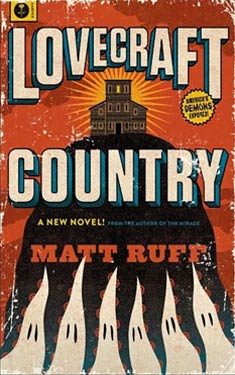Matt Ruff
Completed 1/7/2024, Reviewed 1/7/2024
4 stars
I had trouble getting into this book at first. I didn’t like the writing. I thought it was pedestrian, lacking any emotional force. But as I continued on, I came to really love the characters and feel terrified for them by the supernatural and natural horrors in their lives. It probably didn’t help that I saw the mini-series before reading the book, so I had an expectation of the emotional impact it should have. But after the first story, any qualms I had over the prose dissipated and I could enjoy the stories.
This book was initially pitched as a series like The X-Files. When it came to novel form, it ended up as seven interconnected vignettes, or episodes, featuring the main characters and an eight story that ties them all together. It was a great way to introduce everyone, giving different perspectives and experiences with the horrors of Jim Crow and the Lovecraftian supernatural. The overarching plot is that Atticus Turner is the last surviving descendent of a powerful “natural philosopher,” i.e. a magician or alchemist, from the 1700’s. Caleb Braithwhite is also a descendent and has supernatural powers. He plans to use Atticus and his family and friends to try to take over and unite all the houses/lodges of the Sons of Adam. The result is the seven episodes in the book. I liked all of them, but the two I liked most were about Hippolyta, Atticus’ aunt, and Horace, his nephew.
All three families in the story work or are associated in some way with the “Safe Negroes Travel Guide”, a fictional version of the Green Book, which lists restaurants and hotels and other travel related businesses that serve blacks without harassment or danger. In the story featuring Hippolyta, she goes to Minneapolis to research some entries in the guide, but makes a stop at an observatory on the way. It turns out to be related to one of the now deceased but immensely powerful Adamites, H. Winthrop. She enters it one night, hoping to see the stars and discovers an interdimensional traveling device that reveals the fate of the black staff of Winthrop. I loved this story because the main character wanted to be an astronomer, but being poor and black and a woman in America in the early 20th century didn’t lend itself to that type of opportunity. I, myself had other reasons why I didn’t become an astronomer, but I empathized with the longing.
The other story featured Horace, an asthmatic tween who creates his own comic books. He’s being hounded by white detectives to spy on his parents because they may lead the detectives to Braithwhite. They put a curse on him that worsens his asthma to the point that he cannot speak whenever he tries to tell someone about the investigation. In addition, he’s being chased by a “devil doll”, not unlike the scary tribal doll come to life from “Trilogy of Terror.” I empathized with Horace as a young person struggling with asthma.
The other stories were really good as well, such as the ones about the haunted house that Leticia buys and the potion that turns her sister Ruby into a white spy for Braithwhite. All the stories are hard to read, though, because the Jim Crow prejudice and segregation is so prevalent and severe that it makes you wonder how black people survived the era as they did. Reading it made me uncomfortable in my own skin, the same way watching the film “KKKlansman” made me so uncomfortable. On the lighter side, it inserts black people into the speculative fiction fandom during a time when the authors weren’t black, and there were no black characters.
I give this book four stars out of five. I recommend reading it before seeing the series. If you get a copy of the book with the interview of the author, I highly recommend reading that to get a perspective of the actual events that Ruff directly included or fictionalized within the book.

No comments:
Post a Comment